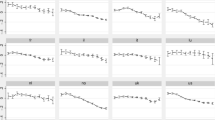Abstract.
Barro and Lee (1994), in an influential empirical study of the determinants of economic growth, find that, whereas growth is positively related to male schooling, it is negatively related to female schooling. Stokey (1994) has suggested that this is largely due to the influence of four Asian countries (Hong Kong, Singapore, Taiwan and Korea) that have very high levels of growth but very low levels of female schooling, and that deleting the female education variable would cast doubt on the statistical significance of the male education variable. Deletion diagnostics and partial scatter plots are analysed to identify influential observations. The sensitivity of the Barro-Lee results to deleting selected countries from the sample and deleting female education from their growth equations is then examined. The results obtained point to the fragile nature of both the significant negative effect of female education and the significant positive effect of male education in the Barro-Lee model.
Similar content being viewed by others
Author information
Authors and Affiliations
Additional information
First version received: September 1996/Final version received: December 1998
Rights and permissions
About this article
Cite this article
Lorgelly, P., Owen, P. The effect of female and male schooling on economic growth in the Barro-Lee model. Empirical Economics 24, 537–557 (1999). https://doi.org/10.1007/s001810050071
Issue Date:
DOI: https://doi.org/10.1007/s001810050071




